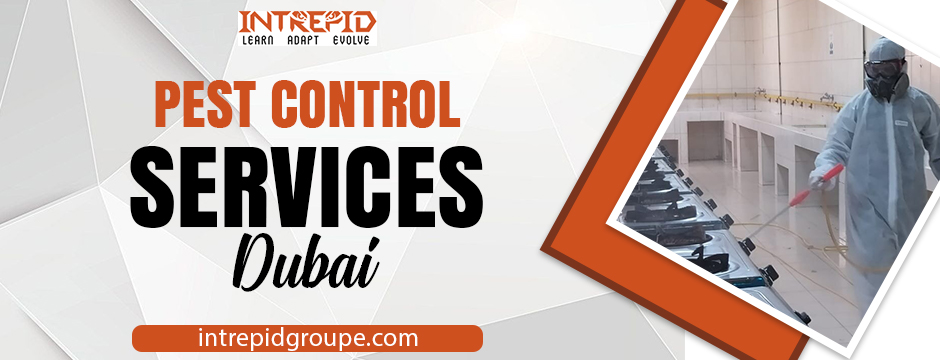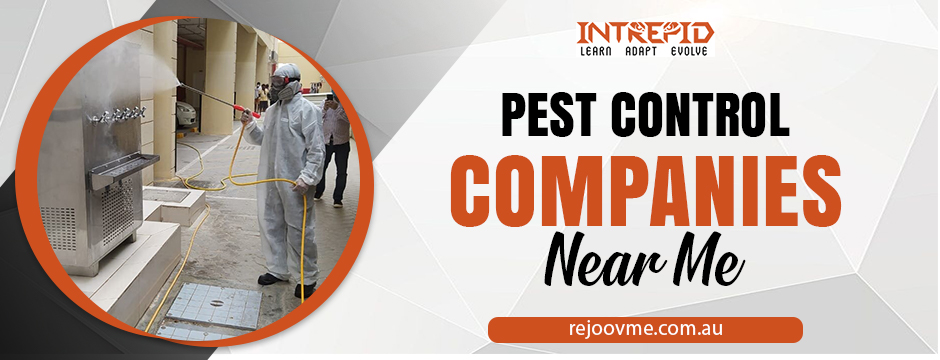
If you run a hotel, restaurant, or warehouse in Dubai, you already know that maintaining a clean, pest-free environment is more than good hygiene — it’s a legal and reputational necessity. In the UAE’s highly competitive commercial landscape, pest control is tightly regulated, and falling short can cost a business its license, reputation, and customer trust overnight.
From strict Dubai Municipality inspections to global hospitality standards, the message is clear: pest control is no longer an afterthought. It’s part of operational excellence.
This guide from Intrepid walks you through how pest control regulations in Dubai work, what best practices top hospitality brands follow, and how your business can stay audit-ready while keeping customers safe and satisfied.
Why Pest Control Is a Compliance Priority in Dubai
Dubai’s modern skyline and hospitality boom have drawn millions of visitors and thousands of F&B establishments. Yet, the region’s warm climate and dense infrastructure create perfect breeding conditions for pests such as cockroaches, rodents, flies, and termites.
The Dubai Municipality has implemented strict health and safety codes to ensure all commercial properties—especially those handling food—maintain high hygiene standards. The Public Health Pest Control Section regularly inspects facilities and issues fines or closure notices if pest control requirements aren’t met.
According to a Straits Research report, the global pest control market was valued at over USD 25 billion in 2023 and continues to grow as industries adopt preventive solutions. The UAE, with its hospitality-driven economy, contributes significantly to this rise.
In sectors like hospitality, logistics, and retail, one pest sighting can spiral into a PR crisis. Online reviews travel fast. A single guest photo of a cockroach in a restaurant can undo months of marketing efforts. That’s why professional pest control services in Dubai are treated not as a cost, but as a safeguard for brand reputation and compliance.
Key Pest Control Regulations in Dubai’s Commercial Sector
Dubai Municipality’s guidelines for commercial pest control are designed to protect both the public and the environment. Below are the essential compliance points every business owner should understand:
1. Licensed Service Providers Only
All pest management must be conducted by Dubai Municipality-approved pest control companies. These companies must hold valid operating licenses and employ certified technicians trained in safe pesticide handling.
2. Regular Scheduled Treatments
Hotels, restaurants, and food warehouses are required to perform pest control treatments at regular intervals, typically monthly or quarterly. The frequency depends on the facility’s size, location, and risk category.
3. Record Keeping & Documentation
Every service session must be documented, with reports detailing areas treated, chemicals used, technician names, and follow-up actions. These records should be readily available for inspection.
4. Use of Approved Chemicals
Only municipality-approved pesticides are allowed. Use of banned or unregistered substances can result in immediate penalties.
5. Pest Prevention as Part of HACCP
For food-related businesses, pest control must be integrated into the Hazard Analysis and Critical Control Point (HACCP) system. It’s not optional — it’s a compliance requirement under international food safety standards.
6. Staff Awareness & Reporting
Employees must be trained to recognize early signs of pest activity and report them immediately. Inspections are often unannounced, so staff readiness is essential.
Sectors Where Compliance Matters Most
1. Hotels and Resorts
Luxury hospitality runs on reputation. Guests expect spotless rooms, dining areas, and common spaces. Pest incidents can lead to public complaints and loss of star ratings. Many hotels in Dubai maintain partnerships with long-term pest control providers for preventive programs, monitoring systems, and 24-hour emergency response.
2. Restaurants and Cafés
For F&B outlets, pest control is part of food safety certification. Regular inspections by Dubai Municipality’s Food Safety Department ensure hygiene standards. Rodent droppings, insects near food prep areas, or contaminated ingredients can result in immediate closure notices.
3. Warehouses and Distribution Centers
Dubai’s logistics sector handles vast inventories of packaged foods, beverages, and raw materials. Rodents and insects can cause significant financial losses through contamination or damaged goods. Compliance ensures smooth customs clearance, safe storage, and sustained business partnerships.
Best Practices: How to Keep Your Business Pest-Free
1. Schedule Routine Inspections
The most successful pest management programs in Dubai rely on consistency. Routine inspections help identify potential breeding sites before infestations take hold. Preventive treatments are far less costly than emergency responses.
2. Partner With Certified Experts
When searching for pest control companies near me, always verify certification, experience, and client references. A certified company will use safe, approved chemicals and maintain proper documentation — essential for passing audits.
3. Adopt Integrated Pest Management (IPM)
IPM is a global best practice that combines biological, mechanical, and chemical strategies for long-term control. It focuses on prevention, monitoring, and minimal use of pesticides. Leading hotels and commercial kitchens in Dubai have adopted IPM for sustainability and compliance.
4. Train Your Team
Even the best pest control services can fail if staff are unaware of hygiene protocols. Conduct regular staff training on food waste management, cleaning routines, and early pest detection.
5. Maintain Sanitation Standards
Proper waste disposal, sealed trash bins, and daily cleaning routines reduce pest attraction. Grease buildup in kitchens, stagnant water in drains, and uncovered food waste are common culprits in pest outbreaks.
6. Seal Entry Points
Pests often enter through small gaps in doors, walls, or utility openings. Maintenance teams should regularly check these access points and seal them to prevent infestations.
7. Stay Audit-Ready
Keep detailed records of pest control visits, invoices, and reports. During inspections, auditors look for documentation that proves consistent compliance. A well-organized file can save hours during an audit and reinforce your commitment to hygiene.
Choosing the Right Pest Control Partner in Dubai
Selecting a pest control provider is not just about price — it’s about trust and compliance. Here’s how to identify the right partner for your business:
1. Check Certification and Licensing
Your provider should be licensed by Dubai Municipality and employ trained, certified technicians. Always ask to see credentials.
2. Review Service Scope
Choose a company that offers complete pest management — from inspection and treatment to monitoring and follow-up. This ensures consistency and better long-term outcomes.
3. Ask About Eco-Friendly Solutions
Dubai’s sustainability goals have encouraged many companies to shift toward green pest control. Inquire about organic or low-toxicity alternatives that align with environmental safety standards.
4. Evaluate Experience in Your Sector
Different industries face different pest pressures. A company that understands hotel operations or warehouse hygiene will customize treatments accordingly.
5. Look for Transparency
A professional pest control provider will explain every step of the process, from chemical selection to safety precautions. They will also offer written reports after every treatment.
6. Consider Technology Integration
Modern pest control services in Dubai now use data-driven tools like smart traps, digital monitoring, and mobile apps for reporting. These features make compliance management easier and more transparent.
Audit Readiness: The Hallmark of a Professional Business
Audits and inspections are regular parts of Dubai’s commercial landscape. Whether it’s the municipality, a hotel brand audit, or a third-party food safety certification, your pest control documentation can determine your compliance rating.
To stay prepared:
- Keep a Pest Control Logbook with all reports, treatment schedules, and certificates.
- Record the date, service type, technician name, and chemicals used after every visit.
- Store MSDS (Material Safety Data Sheets) for all products applied.
- Document staff training sessions related to hygiene and pest control.
- Schedule follow-up inspections after each major treatment to verify results.
A strong paper trail not only protects you during audits but also builds client confidence — especially for international brands or partners seeking high hygiene standards.
The Hidden Costs of Ignoring Pest Control
Businesses sometimes delay pest control to save costs, but that decision often backfires. The consequences can include:
- Fines and Closures: Dubai Municipality can issue penalties or even shut down facilities for non-compliance.
- Product Losses: Contaminated goods in warehouses can lead to significant write-offs.
- Brand Damage: Negative online reviews can deter customers for months.
- Health Risks: Pests spread diseases and allergens, risking employee and guest safety.
- Higher Long-Term Costs: Reactive pest control after an infestation is far more expensive than preventive measures.
Prevention always pays off — financially and reputationally.
Emerging Trends in Dubai’s Pest Control Industry
The pest control sector in Dubai is evolving fast. Businesses are embracing smarter, more sustainable solutions. Here’s what’s shaping the future:
- Digital Monitoring Systems: Sensors and smart traps that send real-time alerts.
- Data-Driven Reporting: Automated documentation that simplifies audits.
- Eco-Friendly Pesticides: Plant-based or low-toxicity chemicals designed for food-safe environments.
- Drone-Based Inspections: Used in large facilities or warehouses to detect pest entry points.
- Subscription Models: Monthly or quarterly plans for hassle-free compliance management.
These innovations show how professional pest control services in Dubai are adapting to meet higher expectations from both regulators and customers.
Why Partner With Intrepid
At Intrepid, we understand that for commercial and hospitality clients, pest control is not just about extermination — it’s about protection, precision, and peace of mind.
We work closely with hotels, restaurants, and warehouses across Dubai, delivering fully compliant, eco-safe pest management programs. Our certified technicians use the latest technology and Dubai Municipality-approved products to ensure every treatment meets audit and safety requirements.
Whether you manage a boutique café in Jumeirah or a logistics hub in JAFZA, our tailored programs help you maintain spotless operations, reduce downtime, and safeguard your reputation.
Final Thoughts
Maintaining a pest-free environment in Dubai’s commercial sector is not a choice — it’s an obligation under health and safety laws and an expectation from today’s discerning customers.
A strong partnership with a certified, experienced pest control provider keeps your facility compliant, your staff confident, and your guests comfortable. The businesses that treat pest control as a core part of quality assurance are the ones that thrive in Dubai’s demanding marketplace.
If you’re ready to strengthen your hygiene standards and ensure full compliance, reach out to Intrepid today. Our team of certified professionals will assess your facility, customize a treatment plan, and help you stay audit-ready — all while keeping your business pest-free and protected year-round.

















Leave a Reply